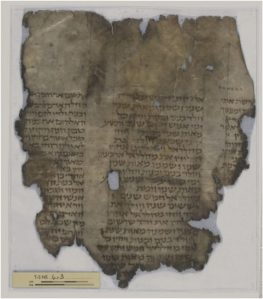
Since we have been looking at the Dead Sea Scrolls and the various manuscripts in the Nag Hammadi Collection, I thought I would lighten things up a bit with some fun facts about basic jewish folklore, the myths and terms that developed as Jewish people scattered out into the world after the destruction of the their Second Temple in 66 CE by Roman troops, during the time of Emperor Nero. These legends and terms are not “official” Jewish theology like the Torah or the other books of the Tanakh. But they did play a part an important part in the daily life of various Jewish communities over the last 2000 years. Many of them are not well known outside of Judaism, so I hope you will find them interesting.
Shokelin: This is the Yiddish word for the swaying that Jews do when they pray, most famously at the Wailing Wall in Jerusalem. The philosopher Judah Halevi was of the opinion that it came from the fact that religious texts were scarce in the post-Second Temple scattering and thus people had to sway so others could peek past them at the open Torah scroll, etc. The Talmud states that shokelin is the expression of ecstasy that Psalm 35:10 refers to (“All my bones shall say, ‘who is like you, oh Lord’…”).
Ziz: a giant legendary bird who is so massive that when standing on the ground its body and head reach all the way up to heaven where it sings songs to God. When some travellers once saw a ziz standing in a lake only up to its ankles they thought the water was shallow enough to bathe in, so they dropped in an axe to see just how deep it would go… it took seven years for the axe to reach the bottom. When the Messiah returns the flesh of the Ziz will be served to the righteous at the resultant celebratory banquet.
A – T – Ba – Sh: A Biblical code in which the first letter of the Hebrew alphabet replaces the last letter and so on. The name is actually the key to the code: Aleph (first letter), Tav (last letter), Bet (second letter), and Shin (second last letter). This system allows for words to be transposed into other words, creating chains of word association for interpretation for both common scripture and mystical literature like the Zohar.
Al Tikrei: A Hebrew phrase meaning “do not read” (i.e. do not read just in the regular way, but other ways as well), al tikrei is a method of using another pronunciation or spelling to give a scripture another layer of meaning while not negating the common reading. This technique was inspired by a segment of Psalm 62:11 – “God has spoken once, and I have heard it twice…”. For example, if (hypothetically) the letters AABA were the Hebrew word for salt and AACA was the word for guitar, a scripture could be then interpreted as “their sins will be like how bitter salt is a terrible choice for lunch”, or “their sins will be as if they had eaten a guitar, a really terrible idea.”.
Agrat Bat Mahalat: Queen of the Demons who wanders around fucking things up along with a cohort of her underlings. Not only is she the concubine of Samael (the king of the demons) but also the granddaughter of Ismael, Abraham’s first son. The sage Chanina Ben Dosa though had the power to banish her from the world forever, so she pleaded with him to allow her to get up to at least a few shenanigans on Tuesdays and Fridays. Thus the Talmud recommends no one go out at night alone on these days.
Pidyon ha-ben: “The redemption of the son”, a ceremony that takes place thirty days after the birth of a first born son. If the family is not from the priestly or Levite class, the rabbi asks the father to choose between handing over five pieces of silver or handing over the child. Naturally, the father pays the money, and the priest waves his hands over the kid, “redeeming” him from just being a regular person. If the son is not the first born, preceded by a sister or miscarriage, or born via C-section, they don’t have the ceremony.
Sitra Achra: An Aramaic word from the Talmud for “the other side”, the opposite of the divine realm, being the realm of demonic powers. This realm of evil power and demons influences mankind, except on the Sabbath when the demons are forced to slither back into the abyss until their power is restored by the arrival of the first day of the week.
Lamed vavnick: “one of the thirty-six”, one of a group of 36 men (in every generation) hiding amongst the general population, men whose righteousness keeps the world from descending into total chaos. If a generation finally arrives that is worthy, one of these 36 will rise up to be the Messiah. Though they can pop out of the woodwork to save and uplift others every once in a while, they must go right back into obscurity, as they are forbidden by God to reveal themselves, upon pain of death. The founder of the conservative Ukrainian Hasidic branch of Judaism (Baal Shem Tov) was said to have known who all 36 of these men were, and helped them out financially.
Chelm: a Polish town whose citizens were used in folklore as the basis of silly stories and jokes, most often local “wise” men who came up with stupidly simple solutions to complex problems. For example, one day the citizens come to a rabbi and say, “how shall we overcome our poverty?’ and the rabbi says, “Easy, it shall now be that the poor will have cream and the rich will have to make do with milk”. The people said, “How will this occur?”, and the rabbi said, “Simple… we’ll call cream ‘milk’ and milk, ‘cream’!”. The Chelmians though are usually kind, compassionate people. Once, when the elderly local deacon responsible for wandering the village and waking everyone up for prayers got too frail for the job, the people of Chelm felt compassion and concern for him. So rather than fire him, they gathered up all the shutters from their windows and installed them in his living room so he could knock on them without having to leave the house!
Olam Haba: the “World To Come”, basically referring to Earth rebuilt back into an Eden-like paradise after the arrival of the Jewish Messiah, though there is differing opinion about whether it is a physical or divine realm. Though it is considered too amazing to be imagined by ordinary humans, the metaphor used to understand it is as if our world now is a narrow hallway in which mankind prepares itself for entrance into the grand banquet hall that is Olam Haba. This new earth is basically the Jewish conception of paradise, rather than a ‘Heaven’ far off in space, as humans remain here for eternity. Every good Jew and even righteous non-Jews would be able to live in this world, as well as anyone who had walked even a few feet in the Holy Land (modern day Israel), But you would lose your place in Olam Haba if you: publicly shamed someone, said the Tetragrammaton (a mystical, ultra-holy name of God) in public, read heretical Jewish books that were not part of or related to the Tanakh, became a scribe or doctor, were not very enthusiastic about observing Jewish customs, or were a man that walked behind a woman. Saying the Tetragrammaton was completely forbidden, as it contained such spiritual power one could use it to perform God-like feats of healing, creation, traveling great distances within seconds, and so on. It is also considered to have been written on the rod that Moses used to part the Red Sea (Exodus 14:16). In Jewish mythology, Adam’s first wife Lilith used the name of God to fly away when she was not given equal status with Adam.
Lilith: Adam’s first wife who was also the demon Queen of the Night. When she requested equality with Adam and God refused she flew away in rage to the Red Sea. Adam complained to God, so He sent three angels to bring her back. They failed but made her promise to not make too much trouble for humanity. Lilith eventually became the wife of Samael, the Prince of Demons and leader of the evil forces in Sitra Achra (the one who also sent the serpent to tempt Adam and Eve). Lilith is known to fly around and attempt to create children by sleeping with men while they are having a wet dream. She also eats children but cannot harm any child with the names of the three angels sent to her at the Red Sea written on its birth-room doorpost. In the Middle Ages it was considered dangerous to drink water at the solstices and equinoxes because during these moments Lilith’s menstrual blood would drip down and poison it.
Shabbos goi: a non-Jew (Gentile) hired to do certain types of work for Jews on the Sabbath, their holy day of rest in which they cannot do many activities in and out of the home, most often lighting oven fires for cooking and such. Technically, Jews are not allowed to ask Gentiles to do things they themselves cannot do… but a Jew could indirectly infer that such a thing needed to be done, and the Gentile could offer to do it to help out. The Russian writer Maxim Gorky worked as a shabbos goi when he was young.
Luz: “almond nut”, a small, nearly indestructible bone at the base of the spine from which God will fashion a new body for righteous resurrected people in Olam Haba. In folklore is is said that the Biblical Flood was so strong that Adam’s luz was dissolved. This bone can only be sustained and fortified in life by regularly eating the final Sabbath supper each week, and bowing to God in prayer is thought to guarantee a strong resurrection body due to the stimulation the luz receives from this act. Luz is also the name of a legendary city situated on the edge of the Holy Land at a site anointed with divine oil by the Biblical patriarch Jacob, whose grandfather was Abraham. Luz was indestructible, and its inhabitants were protected from the Angel of Death. It is hidden from sight and can only be approached through an entrance hollowed out of an almond tree that is also hidden from human sight.
Shlemiel: an inept person, as typified by the citizens and rabbis of Chelm. It is said that when a shlemiel falls on his back he breaks his nose. No matter what the circumstances, the shlemiel will find a way to mess it up. It is said that when the angel that hands out souls was wandering the earth he tripped and all the foolish shlemiel souls fell into Chelm. This is similar to the nebich (“poor thing”), except the nebich is a born loser thanks to his ineptitude, e.g. leaves a winning lottery ticket in his pants and then washes them, or is resurrected into Olam Haba and requests only a piece of toast as his eternal reward.
These are but a few of the many hundreds of terms and legends from Jewish folklore, but I hope you have enjoyed learning about them.
